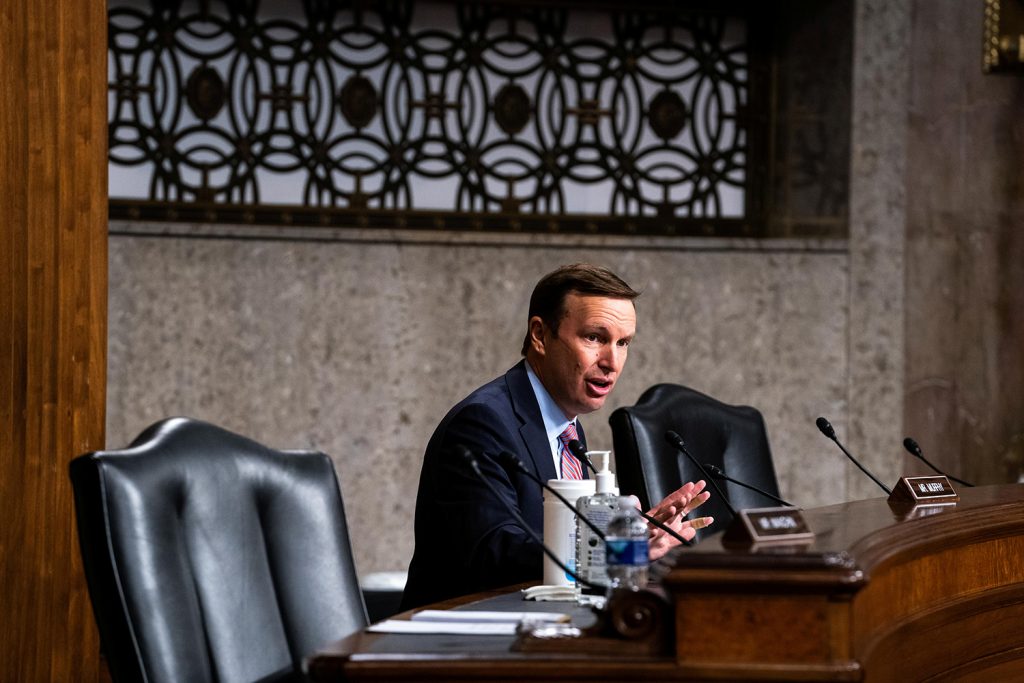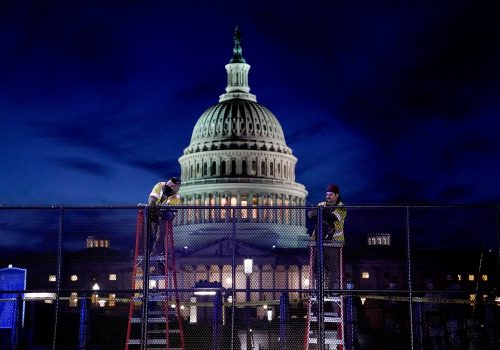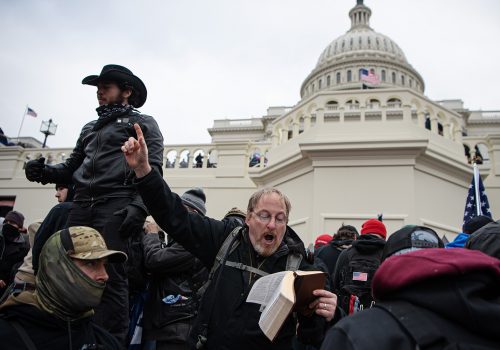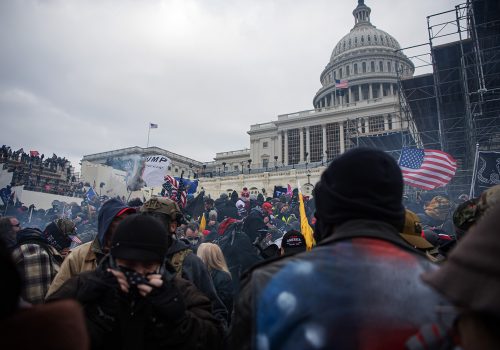The riot at the Capitol on January 6 brought American democracy “to its knees,” US Senator Chris Murphy (D-CT) observed just over a week after the shock to the nation. But that shouldn’t prevent the United States from trying to both “self-correct domestically” and “do the work of democracy promotion.”
In an Atlantic Council Front Page event hosted by the Scowcroft Center for Strategy and Security’s New American Engagement Initiative, Murphy told moderator Major Garrett, the chief Washington correspondent at CBS News, that these two tasks can be mutually reinforcing. “Doing that work abroad puts pressure on us to be a little bit more vigilant and to act a little bit faster on domestic democracy reform.”
Here are some of the highlights from what Murphy said about how the storming of the Capitol riots affect America’s image abroad and the work that lies ahead for President-elect Joe Biden.
Watch the full event
What was behind the Capitol attack
- A stark reminder of the need to take the president’s words seriously: “We made a mistake over and over again during the last four years of not taking President [Donald] Trump at his word,” Murphy said. “We too often thought there was a distinction between the things he said and the policies that he would end up pursuing.” He added that the protesters who stormed the Capitol while he was inside need to be taken “at their word” as well, thanking the Capitol police for “a series of various heroic acts” that ensured that the rioters and lawmakers “didn’t come face to face.”
- Where those words led: Asked whether the riots amounted to an attack by the executive branch on the legislative branch, Murphy said he thought they did: “Clearly, the president’s words incited a riot,” which makes him “responsible for that mob and in that way he’s responsible for the physical attack as well as the constitutional attack on the legislature,” he noted. If Trump had told the rioters to stand down earlier, Murphy asserted, it’s possible that “all of this could have been avoided.”
- Fallout from the forever wars: Murphy also attributed the rioters’ actions in part to “the over-militarization of American foreign policy [and] our fetishization of the United States military and military conduct.” “We do have to understand that there are consequences for perpetual war. There are consequences for telling people that the only way to protect America is to send US troops out to every corner of the globe, when in fact these are largely political problems that are much more effectively met by diplomacy than they are by US tanks and planes.”
- Not nearly out of the woods: Amid fears of more violent protests across the country in the days leading up to Biden’s inauguration, Murphy noted that “we clearly haven’t solved the problem, largely because those that spun up this mob, over a period of weeks, are continuing to say the very same things that caused Wednesday to happen.” The senator holds lawmakers who objected to certifying the US election results to blame; “They could have chosen unification. They could have chosen to stop spreading these lies about the election being stolen, and instead they continued to carry on [with] their objection to the election.”
What it all means for America’s role in the world
- This is bigger than the Capitol attack: Murphy argued that it wasn’t just a loss of faith in the 2020 election among many Americans and the Capitol riots that have changed America’s image in the world: “These last four years have been an absolute disaster for our ability to advocate for democracy and human rights abroad. Wednesday was the fireworks finale of what has been a four-year conflagration of America’s ability to press for democratic reform abroad.” The finale, though, “handed a propaganda victory [to] our enemies,” Murphy said as he pointed to how Belarusian dictator Alyaksandr Lukashenko mocked the United States after the riots and how China equated the rioters with Hong Kong protesters.
- Not a time to give up on democracy: Although America’s image as a democracy may be seriously tarnished, Murphy said, the United States has “always had to deal with our own imperfections… while at the same time [trying] to press other countries to create participatory democracies and open economies like ours.” He added, “If we just sort of rolled up the carpet on democracy promotion abroad, then it frankly [would] be a lot easier for us to just end the project there.”
- Proving democracy works: He urged Americans to “get down to work early in 2021 on ways to make our democracy healthier.” Murphy noted that “a lot of the folks that were part of [the riot had] given up on democracy,” and “we can show them that democracy can still do big things” through measures such as passing a new Voting Rights Act or creating more effective economic policies.
What it all means for the Biden administration
- What Congress should do next: Ahead of Inauguration Day, Murphy said he believes “we’re going to have a peaceful inauguration, one that is going to show the best of America to the world.” And the Congress’s first priorities should “be confirmation of Biden’s Cabinet and passage of a COVID-19 relief package,” he asserted. With Trump’s second impeachment trial looming, Murphy warned that if the Senate is going to go ahead with the proceedings, “let’s make sure that it doesn’t crowd out getting the president’s cabinet into place because we’re in the middle of a domestic crisis.”
- Re-engaging transatlantic partners: One of Biden’s pressing tasks over the next four years will be to repair a transatlantic relationship that has eroded over Trump’s term, Murphy asserted, noting that “many of our transatlantic partners have gone and made other plans” and citing the recent EU-China investment deal. “We’ve seen countries—for instance, like France—start to deploy more unilateral foreign policy towards the Middle East and North Africa. So it is going to take some work to bring those countries back into a transatlantic coalition. But it’s not impossible,” he said.
- Especially on China: The challenge to repair the transatlantic relationship is “vitally necessary” with the rise of China, Murphy added. “The Europeans know and Biden knows there is no strategy to manage the rise of China in a way that doesn’t endanger our security and economic interests without sort of walking every step together with Europeans.”
- A mountain of a challenge: Murphy agreed that the Capitol riot will present a challenge not just for Biden but also for Antony Blinken, Biden’s secretary of state nominee, as he seeks to restore the United States as a beacon of democracy. Blinken “had a huge job ahead of him, right? The mountain that he was going to have to climb to restore America’s credibility was a fourteen-thousand footer; it just became a fifteen-thousand footer.”
Katherine Walla is assistant director of editorial at the Atlantic Council.
Further reading
Image: Senator Chris Murphy (D-Conn.) speaks during a hearing with the Senate Appropriations Subcommittee on Labor, Health and Human Services, Education, and Related Agencies, on Capitol Hill in Washington, U.S., September 16, 2020. Anna Moneymaker/Pool via REUTERS



